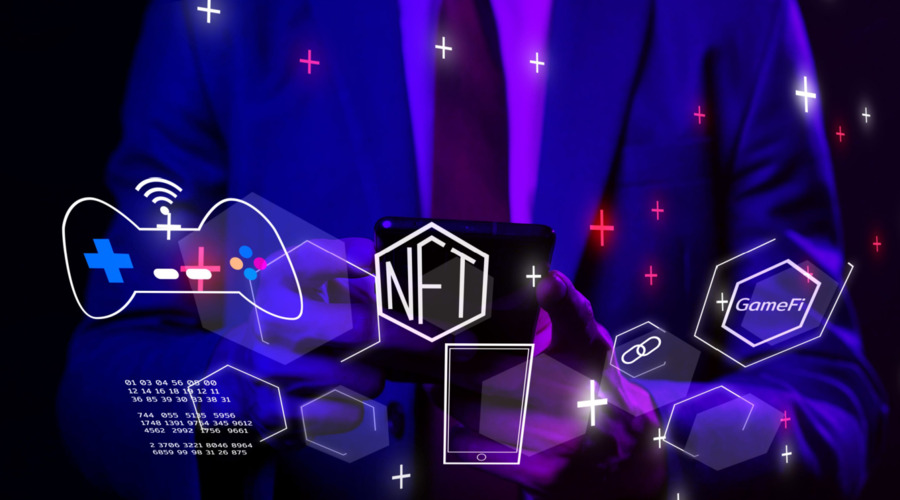NFTs and In-Game Economies of Gaming Industry

NFTs and In-Game Economies of Gaming Industry
The gaming industry has seen a tremendous revolution with the advent of blockchain technology and the concept of NFTs (Non-Fungible Tokens). NFTs are unique digital assets that cannot be replicated, making them valuable and desirable to collectors. In the gaming industry, NFTs have significantly impacted in-game economies, as they provide gamers with an opportunity to buy, sell and trade rare items, skins, and other virtual assets.
What are NFTs, and How do They Work in the Gaming Industry?
Before diving into the impact of Non-Fungible Tokens on the gaming industry’s in-game economies, it is important to understand what NFTs are and how they work in gaming. Non-Fungible Tokens are unique digital assets that are stored on the blockchain, making them immutable, verifiable, and secure. In gaming, Non-Fungible Tokens are used to represent rare in-game items, skins, and other virtual assets that can be bought, sold, and traded on various marketplaces.
How NFTs Have Disrupted the Traditional In-Game Economies
The introduction of NFTs in gaming has disrupted the traditional in-game economies creating a new market for rare and valuable virtual assets. In traditional in-game economies, the value of virtual assets is determined the game developers and is often tied to the game’s progression and achievements. However, with Non-Fungible Tokens, the value of virtual assets is determined the market demand and supply, making them more valuable and desirable.
The Rise of NFT Marketplaces for the Gaming Industry
The demand for NFTs in gaming has led to the emergence of various NFT marketplaces, such as OpenSea, Rarible, and Nifty Gateway, that specialize in trading virtual assets. These marketplaces provide gamers with an opportunity to buy, sell, and trade Non-Fungible Tokens in a secure and transparent manner, therecreating a new revenue stream for gamers and game developers.
How NFTs are Changing the Way Gamers Interact With In-Game Economies
NFTs have changed how gamers interact with in-game economies giving them more control and ownership over their virtual assets. With Non-Fungible Tokens, gamers can buy, sell, and trade virtual assets on their terms without being limited the game developers’ rules and regulations. This has led to the emergence of a new type of gamer, known as the “prosumer,” who is both a consumer and producer of virtual assets.
The Potential of NFTs for Game Developers
NFTs offer game developers a new revenue stream and a way to monetize their games beyond the traditional in-game purchases and subscriptions. By creating rare and valuable virtual assets that can be sold as Non-Fungible Tokens, game developers can generate additional revenue and create a more sustainable business model.
The Challenges of NFTs in the Gaming Industry
Despite the numerous benefits of Non-Fungible Tokens in gaming, there are also challenges that need to be addressed. One of the main challenges is the issue of scalability, as blockchain technology can be slow and inefficient when dealing with a large volume of transactions. Another challenge is the potential for fraud and scams, as the lack of regulations and oversight in the NFT marketplaces can make it difficult to distinguish between genuine and fake NFTs.
The Impact of NFTs on Game Development
The impact of NFTs on the gaming industry extends beyond the in-game economies. NFTs have the potential to revolutionize the way game developers approach game development. By creating virtual assets that can be sold as Non-Fungible Tokens, game developers can generate revenue beyond traditional in-game purchases and subscriptions.
NFTs can also be used as a tool for community engagement and marketing. By creating rare and valuable virtual assets, game developers can incentivize players to participate in community events and competitions, creating a more engaged and loyal fanbase.
The Future of NFTs in the Gaming Industry
The future of NFTs in gaming looks bright as more game developers and publishers are starting to explore the potential of Non-Fungible Tokens in their games. As blockchain technology continues to evolve, we can expect to see more innovative use cases of Non-Fungible Tokens in gaming and other industries.
One area of growth for NFTs in gaming is the use of Non-Fungible Tokens in cross-game economies. By creating NFTs that can be used in multiple games, game developers can create a more interconnected gaming ecosystem, allowing players to trade and use virtual assets across multiple games.
Another area of growth is the use of Non-Fungible Tokens in esports. Non-Fungible Tokens can represent rare and valuable in-game items used in esports competitions, creating a new revenue stream for players and game developers.
Conclusion
NFTs have significantly impacted the gaming industry, creating a new market for rare and valuable virtual assets and disrupting the traditional in-game economies. The potential of Non-Fungible Tokens for game developers is enormous, as they offer a new way to monetize their games and create a more sustainable business model. As blockchain technology continues to evolve, we can expect to see more innovative use cases of NFTs in gaming and other industries, creating a more interconnected and secure digital marketplace for digital assets.
FAQs
Q: What is an NFT?
A: An NFT, or non-fungible token, is a digital asset that is unique and cannot be replicated or replaced. NFTs are commonly used to represent digital art, collectibles, and other unique digital assets.
Q: How are NFTs used in the gaming industry?
A: Non-Fungible Tokens can be used in the gaming industry to represent in-game items, such as skins, weapons, or even entire characters. This allows players to own and trade these items as unique digital assets, increasing the value of the in-game economy.
Q: What is an in-game economy?
A: An in-game economy is a system within a game that allows players to trade, buy, and sell virtual goods and services. This can include in-game currency, items, and other assets.
Q: How do NFTs affect the in-game economy?
A: NFTs can significantly impact the in-game economy creating a new layer of ownership and value for in-game items. With Non-Fungible Tokens, players can truly own and trade their digital assets, increasing the value of the in-game economy and creating new revenue streams for game developers.
Q: What are some potential drawbacks of using NFTs in the gaming industry?
A: Some potential drawbacks of using NFTs in the gaming industry include the environmental impact of NFT production, as well as concerns over exclusivity and accessibility. Additionally, the value of NFTs can be highly volatile, which may affect the stability of in-game economies.
I’ve been involved with cryptocurrency for three years. I have been a vocal advocate for the people and an active part of the community. I am well-known for my book “Crypto Revolution: An Insider’s Guide to the Future of Money” and blog “The Crypto Chronicles.” In addition, I frequently contribute to CoinDesk, one of the top news websites for cryptocurrencies. I write as well as invest actively in a number of bitcoin initiatives.
